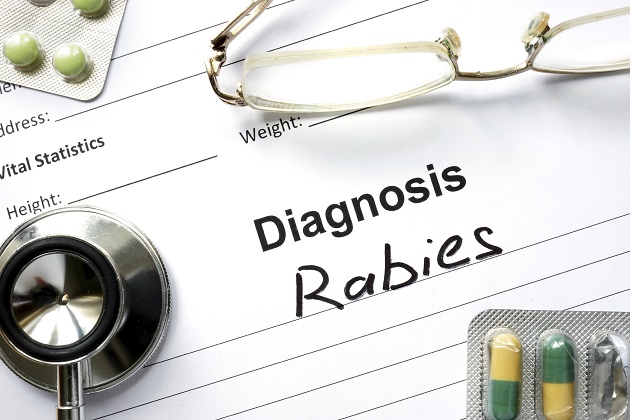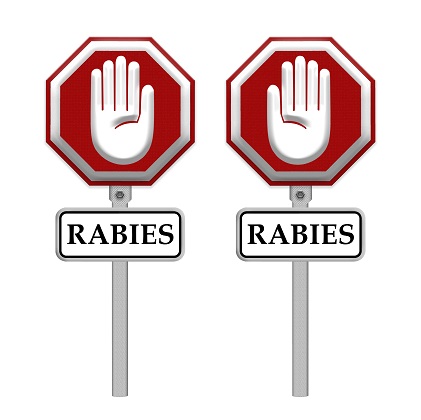Symptoms can develop slowly, and it may take weeks or months after the bite for them to be apparent. It can be five days to more than a year!
Symptoms may include:
Rabies is a very serious disease for humans and can make us very ill.
Rabies is considered fatal for those individuals who are infected and who are not treated within about 24 hours following exposure.
Rabies is a virus that usually lives in animals. It is only found in humans when they have been bitten or severely scratched by an animal that is already infected with the rabies virus. During the bite or scratch, the disease is spread to the human through the saliva or infected body material from the infected animal.
While the rabies virus can be found in animals world-wide, the risk varies by country. There are many countries in the world where there is very minimal risk for this disease.

In the US, the most common source of human rabies infections are found from wild animals – most commonly bats, but could also be dogs, skunks, raccoons, cats, coyotes, foxes, or other mammals. The range of possibly infected animals is SO wide in some countries, that any animal bites warrants medical attention for evaluation. Animal bites to the face and hands are most common for humans, and also the highest risk bites for us.
Rabies is relatively rare in the US, however, many people in this country are vaccinated as a precaution when they are traveling to an area that is high risk due to animal exposure. In other parts of the world, rabies is found more commonly, and there have been more than 40,000 to 70,000 deaths reported worldwide due to rabies each year.
So, do you need to consider preventative vaccination for rabies?
It may be recommended if you are at high risk of exposure to animals:
It may also be recommended if you are an international traveler who is likely to come into contact with animals in parts of the world where rabies is common.
Consideration for vaccination will include:
Symptoms can develop slowly, and it may take weeks or months after the bite for them to be apparent. It can be five days to more than a year!
Symptoms may include:
Once signs and symptoms of rabies develop, no treatment, including any vaccine will improve the outcome.


There are two things that you can do to try and prevent rabies: avoiding potentially rabid animals, and/or completing the Rabies vaccination series before potential exposure.
The vaccine series is recommended and given to individuals at high risk of rabies exposure. It can also prevent the disease if it is given immediately after exposure, but before any symptoms have developed.
The rabies vaccine does not cause the rabies disease.
If you are traveling, and are concerned about your risk of acquiring rabies, the most important action would be evaluation with your travel clinician for professional evaluation of that risk.
The rabies vaccine is a series of three doses, given on a schedule. Periodic testing for immunity and possible boosters may be recommended for individuals working in high risk environments.
If you are bitten or exposed to rabies: ALWAYS seek medical evaluation as soon as possible. Any treatment will be prescribed by the medical professional, and it is important to let them know if you have received the pre-exposure vaccination series.
Have you been exposed to rabies (bitten or scratched)? You must be initially treated by a doctor, who will evaluate the wound and make a plan for vaccinations. In this scenario, the Travel and Immunization Clinic of Portland may be able to complete the post-exposure vaccination series for you.